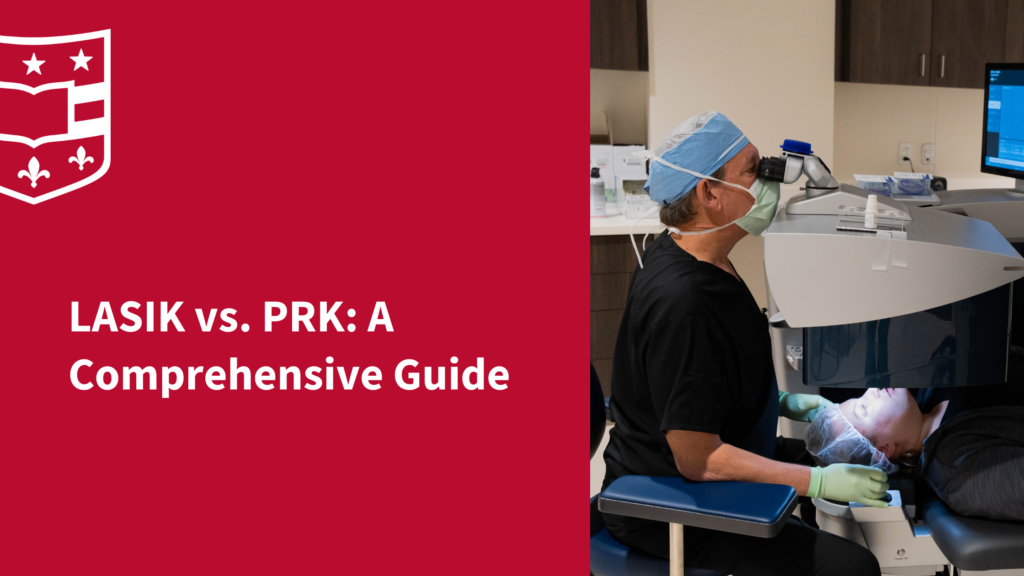When considering laser eye surgery, it’s natural to have questions—maybe even concerns—about which procedure is right for you. LASIK (Laser-Assisted in Situ Keratomileusis) and PRK (Photorefractive Keratectomy) are both highly effective in correcting vision, reducing dependence on glasses or contact lenses, and helping people regain the freedom of clear sight. But while LASIK is well-known for its quick recovery, PRK is often recommended for patients who are not candidates for LASIK.
With insights from Dr. Stephen Wexler, we’ll guide you through the differences between LASIK and PRK so you can feel confident about your next step toward better vision.
LASIK: Fast Healing and Quick Results
If you’re looking for a procedure with quick results, LASIK is a great option. Dr. Wexler explains:
“In LASIK, as you remember, we make a corneal flap, reshape the underlying tissue, and then put that flap back in position. Because only the edge of the flap has to heal, most patients feel comfortable within just four hours and start seeing clearly almost immediately.”
Stephen Wexler, MD
In LASIK, a thin flap is created on the cornea using a femtosecond laser. After reshaping the underlying corneal tissue to correct vision, the flap is repositioned. The healing process is swift, typically resulting in minimal discomfort and quick visual recovery. Most LASIK patients notice a significant improvement in their vision within hours, making it an appealing choice for those eager to get back to their routine with minimal downtime.

Stephen A. Wexler, MD
Professor of Ophthalmology and Visual Sciences
- Email: swexler@nospam.wustl.edu
Medical Director WashU Medicine LASIK Surgery Center
PRK: A Safer, Stronger Foundation for Long-Term Eye Health
For some patients, PRK is not just the better option—it’s the safest one. You may not be a good candidate for LASIK if you have thin corneas, an irregular shaped cornea, corneal scarring, or other unusual findings. In those cases, PRK may be recommended to ensure the best possible long-term results.Dr. Wexler highlights the differences in the PRK procedure:
“With PRK, there’s no flap. Instead, we gently remove the very top layer of the cornea so we can reshape the tissue underneath. That outer layer regenerates on its own, which takes more time.”
Stephen Wexler, MD
In PRK, the outermost layer of the cornea (the epithelium) is removed entirely to access the underlying corneal tissue. The surgeon then reshapes the cornea using an excimer laser. Because PRK allows the cornea to heal without a flap, there’s no risk of flap-related complications. While healing takes longer than LASIK, the end result is just as life-changing—crisp, clear vision that lasts.
Why PRK Might Be Worth the Wait
Yes, PRK requires a little more patience. The first few days may involve some discomfort as your eyes heal, and it can take a few weeks before you reach your sharpest vision. But the tradeoff is peace of mind—knowing you’ve chosen the safest, most stable option for your eyes.
“If we believe PRK is the best option for you, even if it takes longer to heal, we’ll recommend it because our top priority is your long-term eye health”
Stephen Wexler, MD
Some patients may have corneal conditions, thin corneas, or lifestyle factors that make PRK a safer and more suitable option despite the longer recovery time. PRK eliminates the risk of flap-related complications, such as flap dislocation or epithelial ingrowth, making it a preferable choice for certain individuals.
Your Best Vision Starts with the Right Decision
Both LASIK and PRK are proven, safe, and life-changing—it’s just a matter of finding the right fit for your eyes. LASIK offers quick clarity, while PRK provides an extra level of safety for those who need it.
The most important thing? You don’t have to make this decision alone. Our team at WashU Medicine LASIK Surgery Center is here to guide you every step of the way, answering your questions, easing your concerns, and ensuring you feel confident in your choice.
Take the First Step Toward Clear Vision
Your journey to better vision starts with a conversation. Schedule a consultation with our experts today and take the first step toward a lifetime of clarity.
